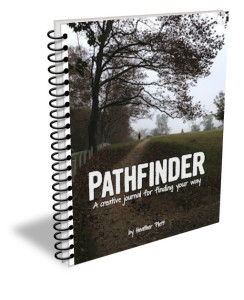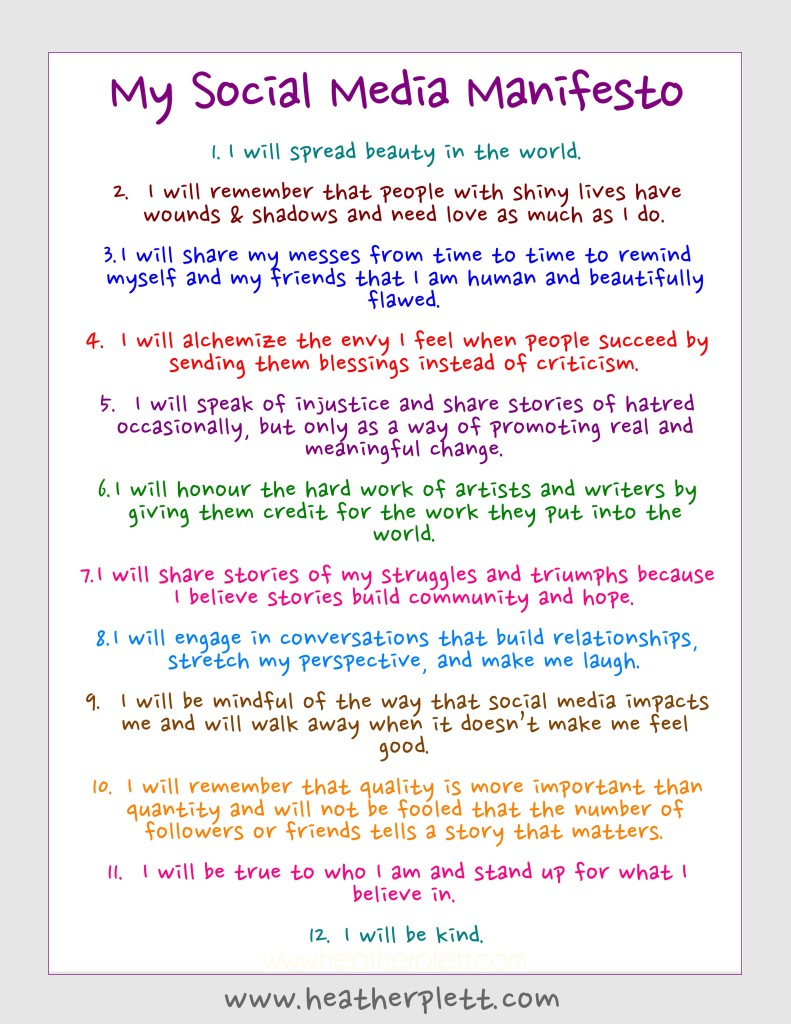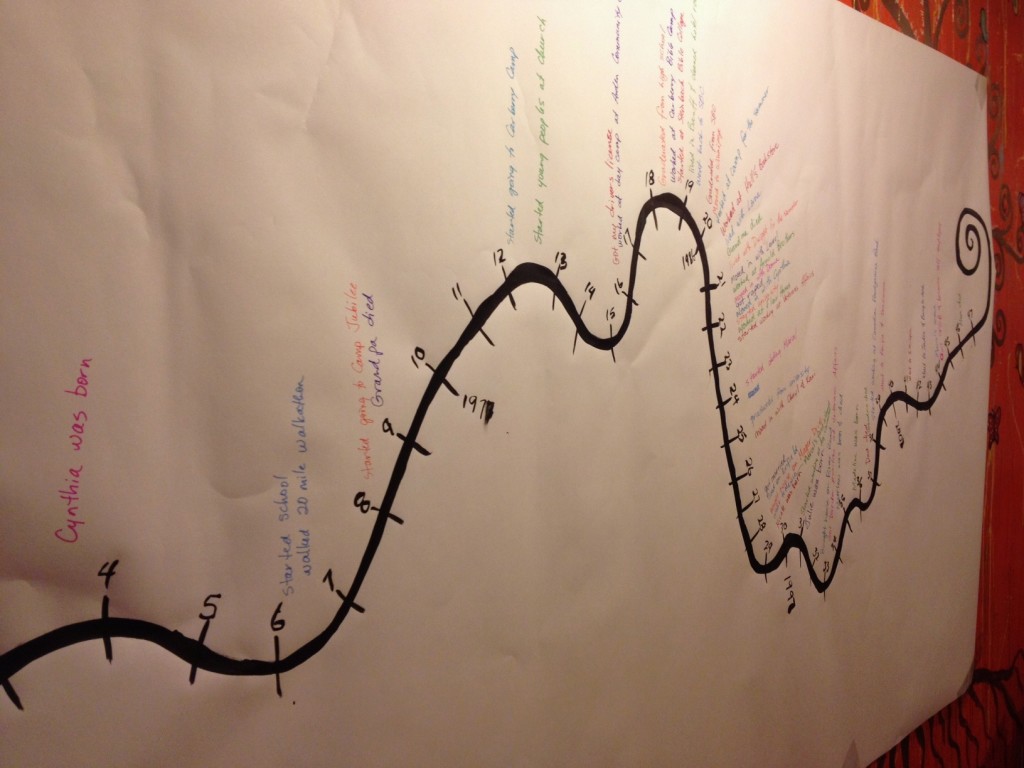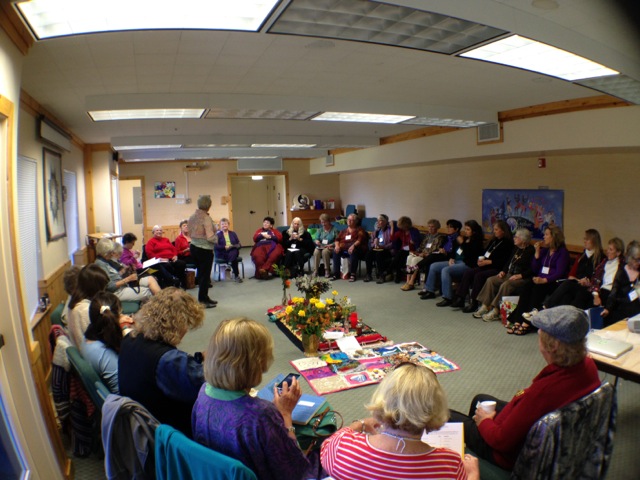by Heather Plett | Nov 26, 2013 | Uncategorized
 I am excited to be able to introduce you to my new baby!
I am excited to be able to introduce you to my new baby!
After months of dreaming, gestating, and creating, I’m ready to birth Pathfinder: A creative journal for finding your way.
This journal is a culmination of a whole lot of the work that I’ve done in the last three years (and more). It brings together a lot of ideas that I’ve developed for workshops, coaching sessions, creative writing classes, and blog posts.
One of the commonalities that I notice again and again in the people who come to my workshops or who hire me as a coach is a desire to find a more clear path toward an authentic, wholehearted, and purposeful life. Many of the people who are drawn to my work find themselves searching for more in life – more joy, more ways to use their gifts, more authenticity, more vibrancy, more community, and more spirituality.
I love working with these people. They are all truth-seekers who are already striving to make a difference in the world, and simply need a little guidance and support to help them step even closer to their true calling. Coming alongside them and helping them find this path is one of my greatest joys in life.
I want this kind of support to be available to even more people – people who can’t afford coaching, don’t have access to workshops or classes, or want to do some personal work on their own before they’re ready to be vulnerable among other people. For that reason I have created Pathfinder: A creative journal for finding your way.
Pathfinder is 118 pages of juicy content, thought-provoking journal prompts, and inspirational creative exercises.
Pathfinder is meant for anyone who needs more clarity in the direction their life is moving. Whether you are profoundly lost and feel like you’re floundering in the woods, or you simply feel a restlessness for a deeper purpose, you’ll find value in working through this journal.
In one of the exercises in the journal, you’ll explore what your core values are. I have pretty strong core values around and fairness and equality, and so I’ve decided to make Pathfinder as affordable as possible. Having worked with incredible people all over the world who are making a difference while living on the edges of the financial economy, I really wanted to create something that was accessible to as many people as possible. Much of what is created in the personal development world is accessible only to those with privilege, and that doesn’t fit with the way I want to work in the world.
For only $22, you’ll get access to a lot of the wisdom I have shared with clients who have paid hundreds of dollars for workshops, retreats, and coaching sessions.
You’ll also have the option of purchasing the journal along with a coaching session for only $85.
I sincerely hope that this will be a meaningful resource for you in your search for your unique path. It is the work of my heart and I would be delighted to know that it touched yours.
You can purchase Pathfinder at this link.
I would be deeply grateful if you would share this with anyone else who might be seeking their path. If you’d like to buy it as a gift for someone, there’s an option to do that on the sales page.
by Heather Plett | Nov 15, 2013 | Uncategorized
I’ve been giving some thought to what kind of presence I want to have online, and I realize it’s not much different from the presence I want to have everywhere I go. (Feel free to share if you want to adopt this as your manifesto too.)

by Heather Plett | Nov 8, 2013 | Uncategorized

Three days ago, I hosted my Creative Writing for Self-Discovery circle, and was delighted when the conversation deepened and the participants started to open up in new ways, tentatively sharing the kinds of stories that only get offered in a place of trust and mutual vulnerability.
Two days ago, I went to see Brené Brown talk and was reminded that vulnerability creates resilience against shame, and that hosting each other’s vulnerability (without offering advice, platitudes, shame or resistance) is the way we create real community.
Yesterday, I worked on a timeline of my life for Christina Baldwin‘s Re-storying Your Life e-course, and found myself broken open once again by grief and memory and love (remembering losing Mom one year ago, plus mapping out all of the losses and stories of love in my life).
Today I am trying to make meaning of all of this, trying to weave the threads together and tell a story of how my life feels cracked open once again. A few more layers of shame, fear, and resistance have been peeled away, a little more clarity about my place in the world has arrived, and it all feels big and important and worth sharing. But so far the words are illusive and the blog post I’d planned to write isn’t showing up.
So I will turn to art instead, and try to paint meaning into the wordless spaces in my head and heart.
For now, I know these simple things to be true:
- Vulnerability is essential for meaningful relationships.
- Deep healing and growth comes when we host our grief well.
- Co-creating circles of grace opens the door to transformation.
- I don’t want to live any other way than authentically.
by Heather Plett | Oct 28, 2013 | Uncategorized
A few weeks ago, when I was visiting my friend Desiree Adaway in Asheville, a recurring theme kept coming up in our conversations – women, race, and privilege.
Community building is high on the list of values that both Desiree and I hold, and within that value is an interest in more effective community building across the gaps that divide us – like race and access to privilege. To get to a deeper place in those relationships that help us build community, we have to be prepared to engage in some of the harder conversations. That means asking questions that might embarrass us, admitting that we might feel some shame around some of the issues involved (eg. the privilege that we did nothing to earn), listening to each others’s stories with open hearts, and being prepared to step out of our comfort zones.
I invite you to listen in on our conversation and add your own thoughts in the comments below.
Note: the video stopped working part way through, but the audio works fine, so we decided to share it as is.
Women, Race, and Privilege from Heather Plett on Vimeo.
by Heather Plett | Oct 26, 2013 | Uncategorized
A few days ago, as I scanned my Facebook feed, I realized that a great number of people I know and love were busy making their way toward interesting gatherings in four places around the US – Portland, Phoenix, Nags Head, and Minneapolis. I was genuinely happy for my friends who were having great opportunities to connect, co-create, stretch themselves, and be refreshed, but underneath the happiness, something else started bubbling up…
Shadow.
Jealousy. Not-enoughness. Self-pity.
The whispers were quiet at first, but then they got louder.
“They’re all busy having a much more interesting life than you have.”
“You don’t really deserve to be at any of those gatherings.”
“They’re connecting with people who are much more interesting than you.”
“The last retreat you tried to host had to be canceled because not enough people signed up. You’re just not interesting enough to draw in the kinds of people that these events draw in.”
“Maybe if you published a book, or did more significant work, people would start paying more attention to your work.”
“Your life is kind of boring and ordinary, isn’t it? While they’re all out having a great time in beautiful locations, you’ll be shopping at Costco, cleaning your house, and driving your kids to all of the places they need to go.”
By now you might be thinking “But Heather… you just had an amazing trip and you were at two really cool events in beautiful places. What right do you have to be jealous of anyone else when you’ve had such great opportunities lately?”
Unfortunately, jealousy has a really short memory, especially when it comes to the good things in our lives. In fact, you can be in the middle of the most beautiful day you’ve ever had, and jealousy can STILL remind you that someone else out there has it just a little bit easier and that the sun shines just a little bit brighter on their house than yours.
Fortunately, I’ve gotten to know jealousy over the years, and I’ve discovered something interesting about it.
When I allow it to be, jealousy can be one of my greatest teachers.
“Teacher?” you’re probably asking. “Shouldn’t I try to banish jealousy rather than invite it in to serve as my teacher?
Well, here’s the thing that I’ve discovered… honouring jealousy as my teacher takes away its power to harm me.
Here’s what I do when jealousy shows up to torment me:
1. Inquire into what it’s trying to teach me about myself. When I’m jealous of someone, it usually means that they have something that I feel I’m lacking. Why is that lack showing up in my life? Does it mean that I genuinely want that particular thing (fame, money, friends, a published book, etc.), or does it mean that I’m carrying a story about myself that I would feel more complete if I had that thing? Would I REALLY feel more complete if I had that thing, or would I simply start looking for the next thing that would fill the empty space in my life?
2. Fill the lack in my life with gratitude. Jealousy can not co-exist in the same space with gratitude. When I start to genuinely honour what is good in my life by naming that which I am grateful for, jealousy loses its power. Suddenly it can’t convince me to believe any stories of lack because my life is full. Today, for example, as I stood looking down at a sink full of dirty dishes that seemed dismally mundane compared to the glamorous things other people were doing, I turned my heart toward gratitude, thanking God for the food that I’d had the pleasure of eating from those plates and the loved ones who’d sat with me while I ate. My life was abundant after all.
3. Set intentions to seek out more of those things that jealousy is pointing me toward. If, in my truth-seeking, I discover that my heart really is longing for something that another person has, then I ask myself what it will take to attain that thing. If I want more opportunities to host retreats or speak at conferences, for example, what can I do to make that happen in a way that is authentic to me? If I want to grow my work, what courage will it take to get there?
4. Offer blessings to those people who have the things that I seek or are doing the work that I long to do. Just like jealousy and gratitude cannot co-exist, jealousy and blessings cannot co-exist. Whenever I can, I try to extend either a silent or spoken blessing toward whoever triggered my jealousy. This is especially important if I recognize that the people I am envious of are doing really important work in the world – the kind of work I want to do more off. In this case, I really want all of the people gathering in these four places to do beautiful work together, because I believe that their work is leading to more conscious living and deeper connection in the world – two things that I deeply value. I want to be connected to good work like theirs, and so I send out a blessing that their work will spread, and that mine will spread too, and that more people will live with intention, integrity, connection, love, and courage. When I begin to look at it like that, I realize that their success is in correlation with my success rather than in competition with it.
5. Be honest and vulnerable in the relationships where I need to be. Often, there is surprising value in being vulnerable with the person who triggers my jealousy. Several years ago, I found myself dealing with a lot of jealousy toward a friend who seemed to breeze through life much more easily than I did. Because we lived in close quarters and I brushed up against this shadow often, I knew I needed to address it. When I told her what was going on, she broke down and admitted that she’d always been jealous of me too, convinced that I made friends more easily than she did. What resulted was a deep and lasting friendship, built on our shared vulnerability.
There is still much for me to learn from jealousy, and so I suspect it will continue to show up in my life to teach me. In the meantime, I offer this blessing to all of those who are gathering in meaningful circles and doing good work in the world:
May this time together be one of healing and deep connection.
May your hearts be broken wide open as you sense into what wants to emerge in this circle.
May you step courageously into the light and may you carry that light with you into the world.
May you hold in your hearts all of the people who are being drawn into this work and may you feel their love from all over the world.
May each of you honour the wisdom you bring into the circle and may you have the courage and discernment to share it generously.
May you also know when silence is the best course of action.
May you know deep trust, both in yourselves and in the others who have gathered.
May your words be full of grace and love and may your questions be full of truth and openheartedness.
May this time you spend together send a ripple of love and healing into communities all over the world and into the earth itself.
by Heather Plett | Oct 23, 2013 | Uncategorized
 In the past week, I have done three interviews – two where I was guest speaker for online courses and one where I was a guest on an upcoming telesummit on feminine wisdom.
In the past week, I have done three interviews – two where I was guest speaker for online courses and one where I was a guest on an upcoming telesummit on feminine wisdom.
The theme that kept coming up in all three of those conversations, and in my recent talk at Patti Digh’s Design Your Life Camp, was this:
We don’t need another hero. (Thank you, Tina Turner.) What we need instead are people who will serve as hosts.
This is not an original thought to me, but the more I learn about it, the more central it has become to the work that I do. (I learned it first from my teachers Margaret Wheatley and Deborah Frieze, and have become immersed in it in my work with The Art of Hosting and Harvesting Conversations that Matter.)
We have built too many of our models (in business, government, church, Hollywood, etc.) on the expectation that someone will show up as the hero to save us from the ills of the world, or that we have to show up as the hero for someone else. What that does is create environments where our heroes have too much power, we assume that the rest of us don’t have the capacity to impact real change, and we become complacent in the face of violence, destruction of the earth, racism, economic imbalance, etc.
Here’s what Meg Wheatley has to say about the difference between a hero and a host:
You’re acting as a hero when you believe that if you just work harder, you’ll fix things; that if you just get smarter or learn a new technique, you’ll be able to solve problems for others. You’re acting as a hero if you take on more and more projects and causes and have less time for relationships. You’re playing the hero if you believe that you can save the situation, the person, the world.
Hosting Leaders create substantive change by relying on everyone’s creativity, commitment, and generosity. They learn from firsthand experience that these qualities are present in just about everyone and in every organization. They extend sincere invitations, ask good questions, and have the courage to support risk-taking and experimentation.
The more I learn about what it means to serve as a host leader, the more I am determined to incorporate it into every part of my life. I am a host leader in the way that I teach at the university, inviting my students into their own creativity, innovation, and way of learning instead of trying to impose my ideas on them. I am a host leader in the way I lead retreats, starting always in circle, where we look into each other’s eyes, see the humanity there, and share our stories in a way that invites both vulnerability and strength to show up. I am a host leader in the way that I parent, creating a container for my children to grow into the best version of themselves, instead of trying to mould them into my view of what they should be. I am a host leader in the way I coach, asking meaningful questions that will reveal my clients’ deepest wisdom and truth.
How can we be more intentional about serving as host leaders? Here are some of the thoughts that have emerged from my many conversations with my teachers and fellow-learners on the subject:
- Start with curiosity. Leaders are usually taught to be decisive and knowledgeable, and to “never let them see you sweat”. That’s a hero model that closes the door to new things showing up and to other people bringing ideas and questions into the room. Instead, open the door to possibility by being curious. What is opening up? What is possible? What do people bring? What would happen if…?
- Host yourself first. Get clear on who you are and where you stand. Find the practices that help to ground you in your own truth and wisdom and that help you withstand the pressures of ego and “the way things have always been”. Inquire into your own stories, triggers, and fears first so that you are more prepared to host what shows up in the circle. (A practice like Mandala Discovery can help with that.)
- Be vulnerable. Admit what you don’t know. Admit that you need other people. Admit your failings. It may seem counterintuitive, but vulnerability is one of the greatest strengths of a leader. Vulnerability invites courage, growth, and meaningful relationships.
- Invite vulnerability in others. Create a space where it is safe to fail, to fall apart, to not know the answer, and to take risks. People will show up with all of who they are when they know that they are safe.
- Trust other people and invite them to bring their creativity, commitment, and wisdom. Every time I teach, I begin by saying “I am not the only person who brought wisdom into the room. Everyone of you brought wisdom, and it is my hope that at some point in this class, you will feel comfortable enough to share it.” Trust them and give them autonomy.
- Ask good questions that open up meaningful conversations. Good questions are invitational rather than assuming. They invite energy rather than trying to contain it. They serve like a garden hoe, loosening the soil so that the seeds can grow.
- Be an active and engaged listener. An effective host leader spends a lot of time in silence. That’s something that’s taken me a lot of time to learn as a leader/teacher/parent – that I am more effective when I am listening to other people than when I am trying to fill the space with the knowledge I feel compelled to offer people. An effective listener/host allows the people in the circle to get closer to their OWN wisdom and stories rather than trying to adopt someone else’s wisdom.
- Start with a “heart at peace” rather than a “heart at war” (from the book Anatomy of Peace). A heart at war sees others as objects to be overcome, colonized, monopolized, directed, changed, while a heart at peace sees the humanity in each person.
- Rearrange the chairs. Most of our classrooms, boardrooms, conferences rooms, etc., are set up in a way that honours the hero model, with the expert at the front of the room. As my circle teachers, Christina Baldwin and Ann Linnea say, “change the chairs and you change the conversation.” Get people into circle and teach them that each person in that circle has some responsibility for holding the container and for honouring every other person in the room. There is no room for a hero leader in a circle.
If this is something you’d like to learn more about, I invite you to attend the upcoming Art of Hosting training that I’ll be co-hosting in Winnipeg in November. This is the kind of training that I wish everyone could take at some point in their life. The more of us who take it, the more the world will change.
 I am excited to be able to introduce you to my new baby!
I am excited to be able to introduce you to my new baby!


